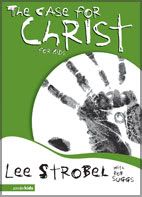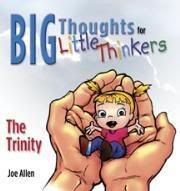 To work on this growth in the ability to think, I have invited my children to do some summer reading. For the two oldest (12 and 10), they have been reading two different versions of Lee Strobel's "The Case for Christ." The 12 year old is reading the student's version and the ten year old is reading the kids' version. Tonight, before we leave for vacation, they will take a test I made and will earn spending money for their vacation based on how well they do on the test. You may object to this form of reward but you do with your kids what you want to do. Here is the test I am giving them:
To work on this growth in the ability to think, I have invited my children to do some summer reading. For the two oldest (12 and 10), they have been reading two different versions of Lee Strobel's "The Case for Christ." The 12 year old is reading the student's version and the ten year old is reading the kids' version. Tonight, before we leave for vacation, they will take a test I made and will earn spending money for their vacation based on how well they do on the test. You may object to this form of reward but you do with your kids what you want to do. Here is the test I am giving them: - Suppose someone approached you and said, “Jesus is not God.” What would you say to defend the Christian belief that Jesus is God?
- Is it possible that Jesus was merely a “good moral teacher?” Why or why not?
- Do you have to trust in Christ alone for salvation? Is there any other way to eternal life?
- What are some of the prophecies that Jesus fulfilled that shows that He is the Messiah of the Old Testament?
- When were the gospels written? What are some evidences that show that we can trust their authority and reliability?
- What would you say to someone who questioned the reliability of the resurrection of Jesus Christ?
 For the two youngest children (almost 8 years, almost 5 years), I just ordered three of these little books. They are fantastic books written at that age level discussing deep subjects like the Trinity, the Bible, the Gospel and the Christian's mission. If you have small children, I encourage you to purchase these for about $6-7 each. Each of these books were endorsed by some very strong men in the evangelical community (who also wrote the foreword in the volumes), such as Al Mohler and Earl Radmacher.
For the two youngest children (almost 8 years, almost 5 years), I just ordered three of these little books. They are fantastic books written at that age level discussing deep subjects like the Trinity, the Bible, the Gospel and the Christian's mission. If you have small children, I encourage you to purchase these for about $6-7 each. Each of these books were endorsed by some very strong men in the evangelical community (who also wrote the foreword in the volumes), such as Al Mohler and Earl Radmacher.Personal Note: The "Gospel" book had a little bit of synergism mixed in but still a good quality book for my "little thinkers."


4 comments:
Good info, Jeff.
I was just dicussing apologetics with Luke over dinner yesterday. I asked the kids what they did in Sunday School and Luke said his teacher asked the class how they knew God existed. I asked him what his answer was and he said that the Bible said so. Then I asked him how he knew the Bible was true. He didn't know that one, so we went through some of the evidences. Then we went back and talked about the cosmological "proof" (it's really more of a self-evidential definition) of God.
It's important to prepare, as though to innoculate, our kids against the inevitable challenges to their young faith.
Another tool is to normalize missional involvement, by which they learn practical dependence on God's provision for activities that glorify God. Therefore, when their faith is challenged, self-justification is less likely to be the greatest inclination of the core of their thinking. Instead, they return challenge with evangelical service: not merely as a behavioral effect but as a mindset.
I've been thinking about this topic a lot lately, especially since my oldest emerged from VBS having learned "some fun songs and that Jesus is my friend."
My parents had a list of books that we were required to read at some point in our childhoods, and I'm in the process of compiling my own for my kids. Any suggestions welcome.
DJT
DJT,
Some really good books I bought for my kids a while back were filled with short biographical chapters on Christians though the centuries that we should know more about. The books go by the titles of:
- Ten Boys Who Changed the World
- Ten Boys Who Made A Difference
- Ten Boys Who Made History
There are also companion books called "Ten Girls..." with the same titles. Excellent books and biographies are wonderful teaching tools.
This is perhaps a bit tangential, but too often we count on mere information as being the stuff of education: hence the error many make of believing they can teach without endorsing a particular worldview. However, comprehension of information is only the beginning of education. The capacity to evaluate and apply this information through analysis and synthesis (Bloom's taxonomy refined) is a much better goal in general.
This in mind, literary study takes different tracks. For example, studying the classics are helpful for evaluating points of reference in the flow of thought through history for application in current events.
At one point the classics were well taught and provided a good frame of reference for communication. This is no longer the case. For a frame of reference today, it is helpful to study current liturature from TV or movies. The challenge for Christians is to do so without ceasing to maintain a Christian worldview. A greater challenge is to teach our children how to do this.
These types of children's books are helpful because it gives kids a frame of reference that they can be taught to use to evaluate the culture propogated in today's popular secular liturature.
Post a Comment